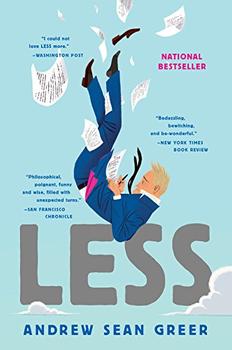Summary | Excerpt | Reading Guide | Reviews | Beyond the Book | Readalikes | Genres & Themes | Author Bio

And still, dutifully, he watches the stopped clock. He does not see the escort standing woefully beside him. He does not see her adjust her scarf, then exit the lobby through the washing machine of its revolving doors. Look at the thinning hair at the crown of his head, the rapid blink of his eyes. Look at his boyish faith.
Once, in his twenties, a poet he had been talking with extinguished her cigarette in a potted plant and said, "You're like a person without skin." A poet had said this. One who made her living flaying herself alive in public had said that he, tall and young and hopeful Arthur Less, was without skin. But it was true. "You need to get an edge," his old rival Carlos constantly told him in the old days, but Less had not known what that meant. To be mean? No, it meant to be protected, armored against the world, but can one "get" an edge any more than one can "get" a sense of humor? Or do you fake it, the way a humorless businessman memorizes jokes and is considered "a riot," leaving parties before he runs out of material?
Whatever it is—Less never learned it. By his forties, all he has managed to grow is a gentle sense of himself, akin to the transparent carapace of a soft-shelled crab. A mediocre review or careless slight can no longer harm him, but heartbreak, real true heartbreak, can pierce his thin hide and bring out the same shade of blood as ever. How can so many things become a bore by middle age—philosophy, radicalism, and other fast foods—but heartbreak keeps its sting? Perhaps because he finds fresh sources for it. Even foolish old fears have never been vanquished, only avoided: telephone calls (frenetically dialing like a man decoding a bomb), taxicabs (fumbling the tip and leaping out as from a hostage situation), and talking to attractive men or celebrities at parties (still mentally rehearsing his opening lines, only to realize they are saying their good-byes). He still has these fears, but the passage of time solved them for him. Texting and email saved him from phones forever. Credit card machines appeared in taxis. A missed opportunity could contact you online. But heartbreak—how can you avoid it except to renounce love entirely? In the end, that is the only solution Arthur Less could find.
Perhaps it explains why he gave nine years to a certain young man.
I have neglected to mention that he has, on his lap, a Russian cosmonaut's helmet.
But now a bit of luck: from the world outside the lobby, a chime rings out, one, two, three, four, five, six, seven, causing Arthur Less to pop out of his seat. Look at him: staring at his betrayer, the clock, then running to the front desk and asking—at last—the essential temporal question.
"I don't understand how you could think I was a woman."
"You are such a talented writer, Mr. Less. You tricked me! And what are you carrying?"
"This? The bookstore asked me to—"
"I loved Dark Matter. There is a part that reminded me of Kawabata."
"He's one of my favorites! The Old Capital. Kyoto."
"I am from Kyoto, Mr. Less."
"Really? I'll be there in a few months—"
"Mr. Less. We are having a problem . . ."
This conversation takes place as the woman in the brown wool dress leads him down a theater hallway. It is decorated with a lone prop tree, the kind the hero hides behind in comedies; the rest is all brick painted glossy black. Less and his escort have run from the hotel to the event space, and he can already feel the sweat turning his crisp white shirt into a transparency.
Why him? Why did they ask Arthur Less? A minor author whose greatest fame was a youthful association with the Russian River School of writers and artists, an author too old to be fresh and too young to be rediscovered, one who never sits next to anyone on a plane who has heard of his books. Well, Less knows why. It is no mystery. A calculation was made: what literary writer would agree to prepare for an interview and yet not be paid? It had to be someone terribly desperate. How many other writers of his acquaintance said "no chance"? How far down the list did they go before someone said: "What about Arthur Less?"
Excerpted from the book Less by Andrew Sean Greer. Copyright © 2017 by Andrew Sean Greer. Reprinted by permission of Lee Boudreaux Books / Little, Brown and Company.
Your guide toexceptional books
BookBrowse seeks out and recommends the best in contemporary fiction and nonfiction—books that not only engage and entertain but also deepen our understanding of ourselves and the world around us.